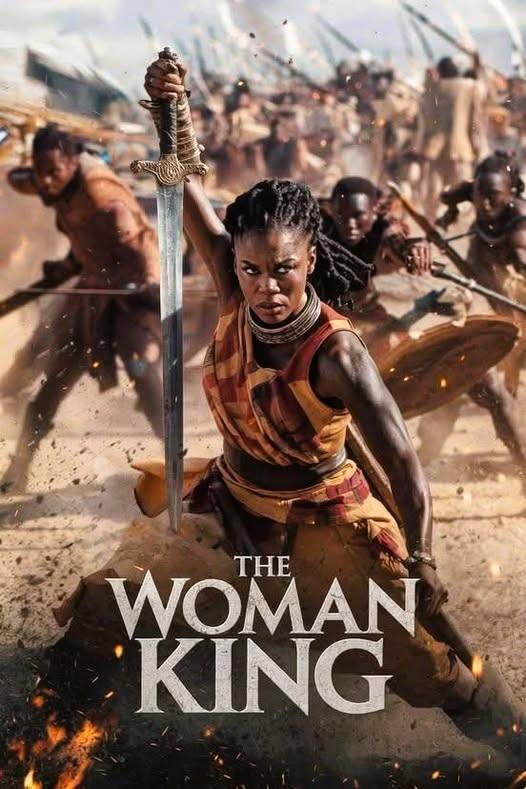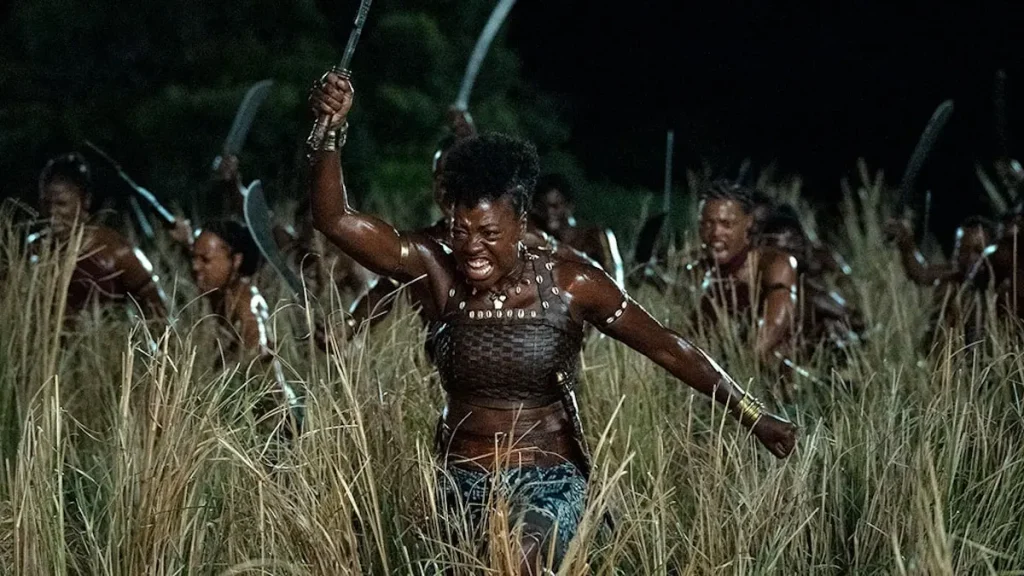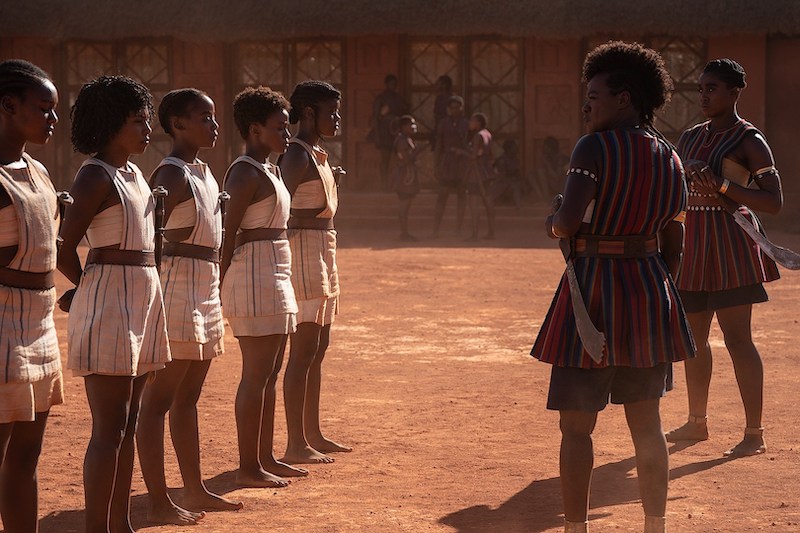The Woman King (2022)

The Woman King (2022): A Fierce, Flawed Epic of Valor and Vision
The Woman King (2022), directed by Gina Prince-Bythewood, is a historical action drama that premiered at the Toronto International Film Festival on September 9, 2022, before a wide U.S. release on September 16 via Sony Pictures and TriStar. With a $50 million budget and a 135-minute runtime, it stars Viola Davis as General Nanisca, leader of the Agojie, an all-female warrior unit in the 1820s West African Kingdom of Dahomey. Co-starring Thuso Mbedu, Lashana Lynch, Sheila Atim, and John Boyega, it blends visceral combat with emotional depth, tackling slavery, trauma, and empowerment. Shot in South Africa, it’s a bold reimagining of a real militia, lauded for its performances and spectacle, critiqued for historical liberties and pacing hiccups. This review cuts to its core—story, craft, cast, and legacy—to weigh its triumph and trials.

Plot Summary: Warriors Rising Against Chains
Set in 1823 Dahomey (modern Benin), The Woman King opens with the Agojie storming an Oyo Empire camp, freeing captives with machete precision. Nanisca (Viola Davis), their grizzled general, trains recruits and advises King Ghezo (John Boyega) to resist Oyo’s raids and European slavers. A new recruit, Nawi (Thuso Mbedu), a defiant teen given up by her father, joins the ranks, clashing with Nanisca’s iron rule but earning her respect.
The plot tracks two fronts: Dahomey’s war with Oyo, led by General Oba Ade (Jimmy Odukoya), and the creeping slave trade fueled by Portuguese dealer Santo Ferreira (Hero Fiennes Tiffin). Nanisca pushes Ghezo to end Dahomey’s slave dealings, haunted by her own past—raped by Oyo soldiers, she birthed a child (revealed as Nawi) left at an orphanage. Subplots weave in: Nawi bonds with veterans Izogie (Lashana Lynch) and Amenza (Sheila Atim), flirts with half-Dahomean trader Malik (Jordan Bolger), and defies orders, sparking tension.
The climax pits the Agojie against Oyo and slavers in a fiery port battle—Nawi’s captured, Nanisca frees her, Oba dies by her blade. Ghezo bans the slave trade, but scars linger—Nanisca and Nawi reconcile, their bond sealed. It’s a three-act rise: training, betrayal, triumph—epic yet intimate.
Production: Gritty Craft Meets Hollywood Scale
Funded at $50 million—a modest sum for its scope—The Woman King grew from Maria Bello’s pitch, scripted by Dana Stevens with Prince-Bythewood’s polish. Shot over 62 days in South Africa’s KwaZulu-Natal, it uses lush jungles and built villages to stand in for Dahomey. Cinematographer Polly Morgan crafts a vivid palette—gold sunsets, red blood—while choreographer Danny Hernandez drills the Agojie’s fights: machetes clash, bodies drop, real sweat shines.
The budget shines in action—village raids, a palm-oil trap igniting slavers—blending practical stunts with subtle CGI. Costumes by Gersha Phillips—beaded armor, flowing robes—root it in 1820s West Africa, researched via Benin museums. Terence Blanchard’s score, with tribal drums and soaring strings, drives the pulse, though it overcues emotion at times.
Producers Cathy Schulman, Viola Davis (via JuVee), and Sony fast-tracked it post-The Old Guard’s Netflix buzz, eyeing a 2022 awards slot. Editing by Terilyn A. Shropshire trims a 150-minute cut to 135, tightening but rushing key beats. It’s a muscular production—raw fights, rich visuals—though historical tweaks spark debate.

Performances: Davis Commands, Ensemble Elevates
Viola Davis is Nanisca—fierce, broken, regal. She’s a force: slashing foes, trembling at rape scars, her eyes a storm of rage and grief. Training at 56—sword drills, sprints—she embodies the Agojie’s steel, her “You are enough” to Nawi a tear-jerker. It’s her career peak, raw power honed since Fences.
Thuso Mbedu’s Nawi balances defiance and vulnerability—dodging suitors, scaling walls, her growth from brat to warrior clicks. Lashana Lynch’s Izogie steals scenes—brash, funny, lethal—her machete twirl a highlight before a gutting death. Sheila Atim’s Amenza, Nanisca’s confidante, brings quiet strength, her divination scenes eerie and grounded.
John Boyega’s Ghezo oozes charisma—playful yet stern, a king caught between old ways and new. Jordan Bolger’s Malik, torn by his slaver roots, adds tender nuance, though his romance with Nawi feels forced. Jimmy Odukoya’s Oba is a stock foe—snarling, one-note—but menacing. The cast syncs—Davis leads, Mbedu rises, Lynch and Atim shine—lifting a script that leans on their fire.
Themes: Power, Trauma, and Resistance
Empowerment drives The Woman King—the Agojie defy gender norms, their strength a fist to patriarchy. Trauma cuts deep: Nanisca’s rape, Nawi’s abandonment, freed captives’ scars—pain fuels fight. Resistance shapes it—against Oyo, slavers, Dahomey’s own complicity—though the slave-trade ban feels tidy, glossing real history (Dahomey sold slaves into the 1850s).
Sisterhood binds—Nawi and Izogie banter, Nanisca and Amenza heal. Legacy looms: Nanisca’s past births Nawi’s future, a cycle of survival. It’s a feminist war cry with African roots, sidestepping white-savior tropes, though sanitized history dilutes its edge. Action over lecture, it’s visceral, not preachy.

Strengths: Action, Davis, and Cultural Punch
The action rocks—raids pulse with machete chaos, the oil-trap ambush a fiery thrill. Davis anchors every frame—her roar, her silence, her scars make Nanisca mythic yet human. Fight choreography stuns: real women, real hits, no doubles for Davis or Lynch. South Africa’s vistas and Phillips’ costumes root it in place—a rare Hollywood epic led by Black women.
Emotional beats land—Nanisca’s confession to Nawi, Izogie’s death—raw and earned. At 135 minutes, it’s brisk for its scope, balancing war and heart. Cultural heft shines—Dahomey’s lens, not Europe’s, flips the script on colonial tales. It’s a bold, bloody celebration, flaws and all.
Weaknesses: History, Pacing, and Subplot Clutter
Historical liberties jar—Dahomey’s slave trade didn’t end in 1823; the Agojie fought for it. Oyo’s villainy oversimplifies—real rivalries were murkier. Pacing stumbles: a bloated midsection (training, Malik’s flirt) slows the charge, the finale rushes reconciliation. Nawi’s romance with Malik feels tacked on—sweet, not vital—eating screentime.
Villains lack depth—Oba’s a cartoon, Santo a prop. Emotional arcs repeat: Nanisca’s trauma loops, Nawi’s defiance flags. Some CGI—fire, crowds—looks cheap, undercutting grit. It’s a streamlined epic that sacrifices nuance for uplift, risking soapbox vibes over raw truth.
Reception: Cheers, Cash, and Controversy
TIFF 2022 gave it a standing ovation—Davis wept, buzz soared. Opening weekend hauled $19 million domestic, ending at $67 million U.S., $94 million worldwide—strong for a $50 million original. Critics raved: Variety (Owen Gleiberman) called it “a rousing action epic”; The New York Times (Manohla Dargis) praised “Davis’s titanic force.” Rotten Tomatoes hits 94% (8.2/10, 285 reviews), audience at 95%—“empowering,” “thrilling.”
Dissenters struck: The Wrap (Jason Solomons) flagged “historical revisionism”; Slate (Nitish Pahwa) saw “glossy propaganda.” X debates flared—praise for Black women’s strength, pushback on Dahomey’s slave-trade whitewash. Oscars 2023 snubbed it—costume and makeup nods only—sparking “Davis deserved better” cries. It’s a hit with crowds, a lightning rod for purists.

Cultural Impact: A Milestone with Echoes
The Woman King joins Black Panther in Black-led epics—Dahomey’s spotlight a rare win. Davis’s star turn, Prince-Bythewood’s helm break ground—Hollywood’s first big-budget African warrior tale by women of color. Its slave-trade tweak fuels talk: empowerment vs. accuracy, a live wire in 2022’s culture wars. Streaming on Netflix keeps it hot—schools, fans, feminists champion it. No sequel yet, but its mark is deep—a call for more.
Final Verdict: A Roaring, Rough Triumph
The Woman King is a fierce beast—Davis’s Nanisca, the Agojie’s blades, a story that swings big. Action thrills, performances sear, cultural weight lands hard. Historical fudges, pacing dips, and thin foes blunt its edge—it’s not Gladiator’s sweep or 12 Years a Slave’s bite. But at its core, it’s a victory: raw, proud, alive. Watch it for Davis’s might and a warrior’s heart, flaws be damned.
Score: 8.5/10. A bold, bloody crown that shines brighter than it cuts.